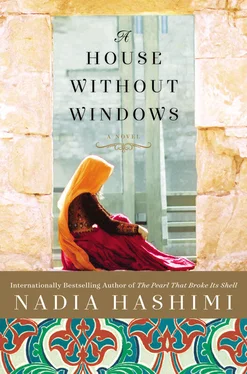Zeba stared out the window and moaned softly. “Yusuf, why did you let them bring me here?”
“I didn’t have much choice,” he mumbled. If they’d been assigned to any other judge, they wouldn’t be here, Yusuf noted. Then again, with any other judge, Zeba might have been convicted long ago.
“Welcome,” the man said as Yusuf, Zeba, the prosecutor, and one male prison guard stepped out of the car. “I am Mullah Habibullah. Welcome to the shrine.”
Zeba’s ankles had been chained together. Yusuf, distracted by the surroundings, did not notice her shuffle her feet to position herself closer to him than the male prison guard.
The prosecutor shook Habibullah’s hands and put a hand on his elbow.
“Thank you, Mullah- sahib . I’m sure your esteemed friend, Qazi Najeeb, explained the situation to you. We’re here to have this woman evaluated,” he said, nodding his head in Zeba’s direction. “She’s killed her husband and has been acting erratically. We need your opinion on whether or not she’s insane.”
Yusuf stepped toward Habibullah with an outstretched hand that Habibullah shook firmly.
“I’m this woman’s defense lawyer,” Yusuf explained.
“I thought you might be,” Habibullah said with a hint of a smile. He turned his attention to Zeba, studying her while she kept her eyes to the ground. He was a slight man, dressed in a beige tunic and pantaloons. Over his tunic, he wore a military green vest with zippered pockets. The end of a small turban dangled past his left ear and hung as low as his salt-and-pepper beard.
“Forgive me, Mullah- sahib, but how long do you think you’ll need to evaluate this woman? I want to be back in the office in the afternoon.”
For once, Yusuf and the prosecutor were on the same page. Yusuf had promised to report back to Aneesa, who had seemed entertained by the prospect of his client being evaluated at the local shrine.
He’ll find her insane only if he thinks he can save her, she’d predicted. But I still don’t think the judge is going to stand by any insanity defense. It’s a reach, even for someone as optimistic as you.
“Gentleman, I can sense your uncertainty. Let me show you around, and I’m sure you’ll feel more reassured.”
Habibullah walked, his fingers casually intertwined behind his back, toward a small stand-alone structure that stood in the shade of a looming acacia tree.
The lawyers shot each other a look before following.
“Bring her,” the mullah called out without turning his head. The prison guard let out a heavy sigh. He crouched down and undid the shackles from Zeba’s ankles, replacing them on her wrists. When he was done, he motioned for her to follow the others.
They bowed their heads as they stepped through the low door frame. Inside the mausoleum, the ceilings were elevated, and one side of the room had a small bench built into the clay wall. In the center of the room was a concrete tomb, over which neatly lay a green cloth with gold-embroidered Qur’anic scripture. The room was barely large enough for all of them to fit inside. A narrow shaft of daylight entered through a rectangular window and shone onto the green flag, on a patch it had faded over time.
Zeba turned away from the tomb. There was too much death in this small room for her liking. Her eyes fell on a few handwritten messages scrawled on the walls.
There is no God but Allah.
Allah, the All-Knowing and the Beneficent.
“This tomb, my friends, is the tomb of Hazrat Rahman. He was a wise and learned man, a true disciple of the Qur’an. He traveled to Mecca twenty times in his life, and it’s widely known that he was the founder of this village.”
Yusuf looked at Zeba, who had moved from the corner toward the small window. She was staring out at the chain-link fence with ribbons of every color tied to the latticework, loose ends flapping hopefully in the soft breeze. Just beyond the fence was an open yard with an L-shaped structure on one end. Yusuf saw Zeba’s eyes narrow in on the long flat-roofed structure, barely tall enough for a man to stand in. He could see her breathing quicken.
“What’s that building over there, Mullah- sahib ? The one past the fence. .”
The mullah pointed to the door.
“Let’s step outside and I will tell you.”
Zeba was glad to be back out of the stifling room.
“That’s where I’ve treated some people who have come to me with very serious problems of mind and soul,” he explained, his voice rich with pride. “This shrine is stronger than any medication, when one believes.”
“What kind of treatments do you provide?” Yusuf asked, nearly choking on the word “treatments.”
Too many people, Yusuf thought, put faith in talismans, trinkets, and superstitions. But Yusuf was also hesitant to criticize. He’d suffered breathing problems as a child. When he was two years old, he’d had an attack so severe that his mother and father had feared he wouldn’t survive. His mother had taken him to a doctor, but the elixir he’d prescribed had done very little for Yusuf. His mother, watching her son’s stomach heave and chest rattle with cough, had then taken him to a shrine in Kabul where a mullah had prayed for him and another man had written a talisman. It was a tiny folded piece of paper wrapped in cloth that Yusuf’s mother had pinned to the inside of his shirt, just over his left chest. In two days, his shortness of breath had resolved, and in the following years, his asthmatic attacks came much less often and were much milder. His mother had been convinced that the talisman, not the doctor’s prescription, had done the trick. Yusuf, having heard the story a few dozen times growing up, had accepted it as truth.
“Our prayers are more powerful than any tool, any drug, any weapon. I pray for the poor individuals who come here to Hazrat Rahman’s tomb and those who tie their wishes to the fence. God is listening, always, to those who believe.”
“And what’s over there?” Yusuf said, shielding his eyes from the sun with a hand. He pointed to the structure Zeba had noticed from inside the mausoleum. He could make out what looked like a row of honeycomb cells, open to the fenced-in courtyard.
Zeba walked to a large rock and sat on it. She let her head fall toward her knees. The prison guard eyed her with suspicion but let her be.
“That’s where I treat some of the more serious cases,” the mullah said with his head cocked to the side. “Not everyone’s illness can be cured with a simple prayer. Sometimes, it takes a period of cleansing the mind and body. Sometimes those who are ill need to be confined in a place of solitude where their energies can be channeled into conquering their maladies. This is that place.”
“You have people in there?”
“I do,” Mullah Habibullah stated. “Sometimes they wander through the yard. Most of the time they sleep or talk to themselves.”
“What about food and drink?” Yusuf asked. The prosecutor listened in. He was familiar with this shrine, though he’d never been here personally.
“They are fed bread and black pepper along with plenty of water. These are the foods that we’ve learned treat the ailments of the mind. Other foods can poison the healing process or delay their recovery. This is the best way to get true relief.”
“Bread and black pepper? That’s all they’re fed?” Yusuf was incredulous. How could such a place actually exist? There were hospitals in every major city, and the nearest one was not that far from this shrine. Why wouldn’t families take their loved ones there instead?”
“For every patient those hospitals treat, there are a hundred more waiting to be seen. You’re skeptical of this idea, but that’s only because you haven’t seen what this place can do. I assure you, if you speak to the patients who have passed through this shrine, they will tell you how grateful they are for having been cured here.”
Читать дальше











